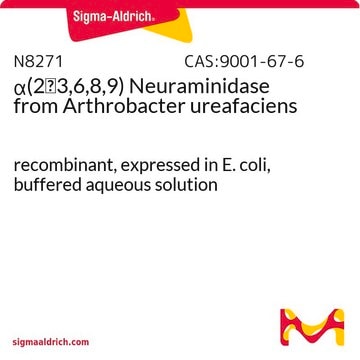N5254
Neuraminidase Agarose from Clostridium perfringens (C. welchii)
Type VI-A, ammonium sulfate suspension
Synonym(s):
Acylneuraminyl hydrolase, Receptor-destroying enzyme, Sialidase
About This Item
Recommended Products
type
Type VI-A
form
ammonium sulfate suspension
specific activity
20-60 units/g agarose
extent of labeling
0.6-1.8 units per mL gel
20-60 units per g agarose
matrix
beaded agarose
storage temp.
2-8°C
Looking for similar products? Visit Product Comparison Guide
General description
Application
Unit Definition
Physical form
Preparation Note
Storage Class Code
12 - Non Combustible Liquids
WGK
WGK 3
Flash Point(F)
Not applicable
Flash Point(C)
Not applicable
Certificates of Analysis (COA)
Search for Certificates of Analysis (COA) by entering the products Lot/Batch Number. Lot and Batch Numbers can be found on a product’s label following the words ‘Lot’ or ‘Batch’.
Already Own This Product?
Find documentation for the products that you have recently purchased in the Document Library.
Customers Also Viewed
Articles
Understand sialic acid structure, function, signaling, and modifications. Easily find products for sialic acid research.
Understand sialic acid structure, function, signaling, and modifications. Easily find products for sialic acid research.
Understand sialic acid structure, function, signaling, and modifications. Easily find products for sialic acid research.
Understand sialic acid structure, function, signaling, and modifications. Easily find products for sialic acid research.
Our team of scientists has experience in all areas of research including Life Science, Material Science, Chemical Synthesis, Chromatography, Analytical and many others.
Contact Technical Service





